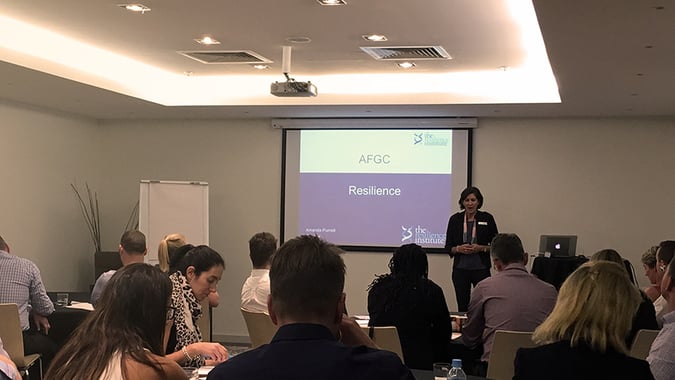
Resilience – More Than Bouncing-Back

A couple of weeks ago, I attended an event organised by the AFGC, which focused on resilience.
Wellness and mental health issues are of growing importance for many businesses, so it was great to see attendees at the event from so many organisations of different size and scale. The session provided an opportunity to self-reflect, and have some very open discussions with others in the FMCG sales community about the challenges faced in our lives that compromise our ability to be our best selves.
Amanda Purnell, Director of Springfox facilitated the event. She defined resilience as “a learned ability to demonstrate courage, creativity, and form strong connections” not just the ability to “bounce-back” in the face of adversity. By this definition, to be resilient means to flourish, not just to be free of negativity.
When is your resilience compromised?
A common theme was that resilience is compromised when there is a blurred line between work and play. Technological advancements and 24/7 connectivity, prevent us from switching-off. Reading and replying to emails late at night results in disengagement at home and over-thinking prevents sleep. As professionals in a competitive world, we strive for success and this often means we strive to work longer and harder, not smarter.
It is important to look after ourselves and others, to recognise if our resilience is under threat. This can include: confusion, disengagement or withdrawal, and in more extreme circumstances, feelings of vulnerability, distress, and even depression.
What are some of the ways we can train ourselves to be more resilient?
-
Mastering our Stress
Recognise the symptoms of increased pressure and take steps to calm down. Breathing techniques and meditation are proven to help.
-
Energise our Body
Sleep is so important and sometimes we forget we need regulated sleep to perform at peak levels. Less caffeine is always a good idea, although it does have some health benefits, consumed in moderation. We also need to eat less food from packets (processed sugars are the worst).
-
Engage our Emotions
Reflecting on positive instead of negative events in our day has a genuine impact on our brains. Spending time thinking about our successes rather than our failures doesn’t always come naturally, but making a conscious effort to do so will change our way of thinking.
-
Train the Mind
Mindfulness is often talked about today. Most of our stresses are caused by thinking about the past or the future, the two things we have no control over. Taking the time to think about the present moment, the only thing we can control can have a calming effect on our thoughts.
-
Staying Connected
Time spent with those we care about has a huge positive impact on our wellbeing. Be compassionate and spend time considering the perspectives of others. Our spirit is lifted when we do things we are passionate about. Find, or spend time doing, something you love.
Making it Habit
Purnell advised us to pick two new habits to integrate into our day. It takes 21 days to create a habit, and If we find a “buddy” to whom we commit to make changes, we are more likely to succeed.
I decided to go with a reduction of caffeine, allowing myself to sleep better and for longer. The second is a self-imposed digital detox each night once I walk in the front door. It’s so easy to be distracted by the ping of an email to our mobile device mid-way through a conversation, dinner or a movie, and what for? I’m learning to be more present, both at home and at work. It’s the smallest changes that can make a big difference, and I have started the journey to improve my own resilience.
If you are interested in resilience training for your organisation, Amanda can be contacted on 0434 077 198 or amanda.purnell@springfox.com
If you would like to hear more about Danielle’s resilience journey, give her a call on 03 8613 3598.
Related


Stay ahead of the EOY crunch with contracting
Even though December comes around the same time every year, somehow it still manages to hit us with...
.jpg?width=352&name=FMCG%20Sales%20-%20Blog%20(3).jpg)
FMCG Sales: 2025 Trends & Hiring Challenges
In a market defined by consolidation, and caution, FMCG Sales leaders are facing increased pressure...

 Accessibility
Accessibility